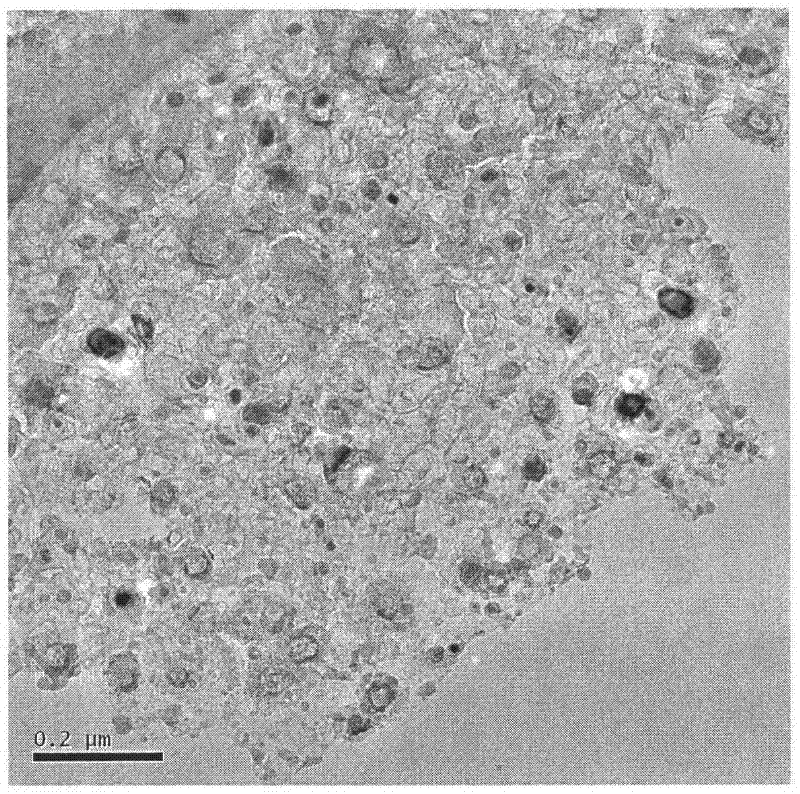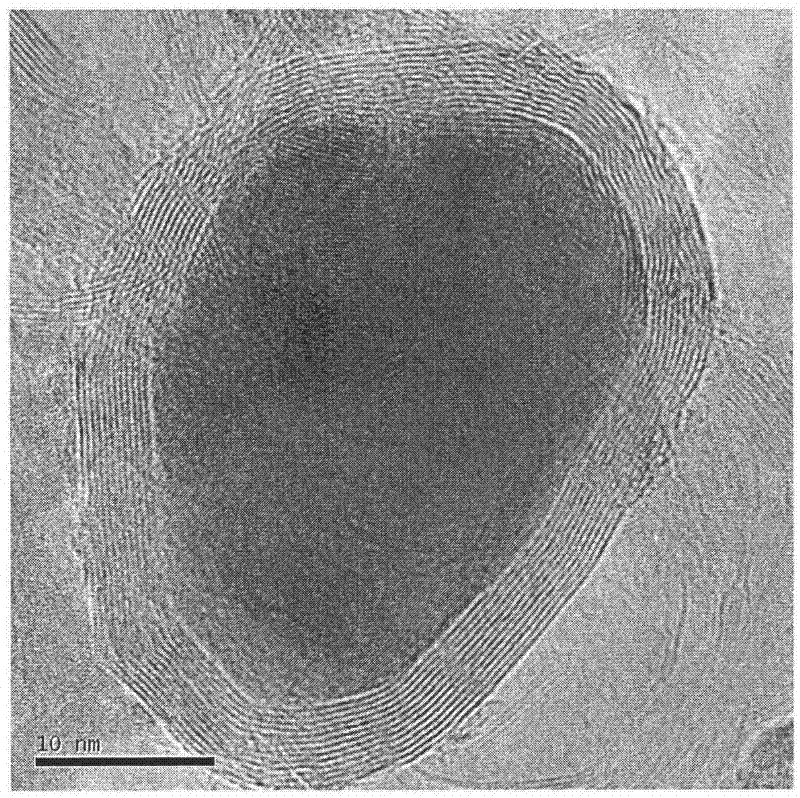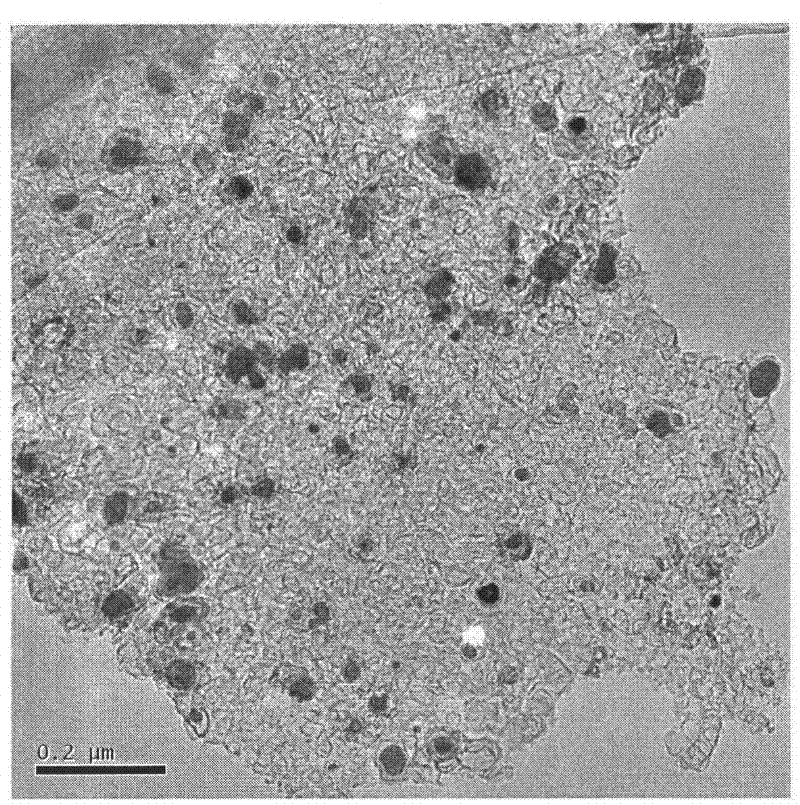Preparation method of carbon-coated metallic nano-particles
A metal nanoparticle and carbon coating technology, which is applied in the preparation of microspheres and microcapsule preparations, can solve the problems of metal toxicity, limited application, reduced magnetism and dispersibility, and achieve high degree of graphitization and large specific surface area , the effect of simple operation
- Summary
- Abstract
- Description
- Claims
- Application Information
AI Technical Summary
Problems solved by technology
Method used
Image
Examples
Embodiment 1
[0030] Weigh 1.2g of glucose, 0.808g of ferric nitrate and 11.1g of NaCl, dissolve the mixture in 50ml of deionized water, stir and dissolve with a magnetic stirrer at a stirring speed of 300r / min to form a solution, and then use a 400W ultrasonic Sonicate for 15min and mix well. The mixed solution was added into a petri dish, and the petri dish was put into a vacuum drying oven at 80° C. for vacuum drying until the mixture was obtained. Grind the mixture, take 2g of the mixed powder and place it in the ark, put the ark into the tube furnace, first pass 200ml / min of Ar inert gas to remove the air, then use 100ml / min of Ar inert gas, and at 10°C / min The heating rate of min is raised to 300°C to decompose the carbon source, and after holding for 1 hour; then continue to pass in Ar inert gas with a flow rate of 100ml / min, and raise the temperature to 700°C at a heating rate of 10°C / min, and hold for 2 hours. Carbonization, cooling to room temperature under the protection of Ar a...
Embodiment 2
[0032] Weigh 1.2g of glucose, 0.808g of ferric nitrate and 11.1g of NaCl, dissolve the mixture in 50ml of deionized water, stir and dissolve with a magnetic stirrer at a stirring speed of 300r / min to form a solution, and then use a 400W ultrasonic Sonicate for 15min and mix well. The mixed solution was added into a petri dish, and the petri dish was put into a vacuum drying oven at 80° C. for vacuum drying until the mixture was dried. Grind the mixture, take 2g of the mixed powder and place it in the ark, put the ark into the tube furnace, first pass 200ml / min of Ar inert gas to remove the air, then use 100ml / min of Ar inert gas, and at 10°C / min The heating rate of min is raised to 300°C for carbon source decomposition, and after holding for 1 hour; then continue to pass in Ar inert gas with a flow rate of 100ml / min, and raise the temperature to 750°C at a heating rate of 10°C / min, and hold for 2 hours. Carbonization, cooling to room temperature under the protection of Ar atm...
Embodiment 3
[0034]Weigh 1.2g of glucose, 0.808g of ferric nitrate and 11.1g of NaCl, dissolve the mixture in 50ml of deionized water, stir and dissolve with a magnetic stirrer at a stirring speed of 300r / min to form a solution, and then use a 400W ultrasonic Sonicate for 15 minutes and mix well. The mixed solution was added into a petri dish, and the petri dish was put into a vacuum drying oven at 80° C. for vacuum drying until the mixture was obtained. Grind the mixture, take 2g of the mixed powder and place it in the ark, put the ark into the tube furnace, first pass 200ml / min of Ar inert gas to remove the air, then use 100ml / min of Ar inert gas, and at 10°C / min The heating rate of min is raised to 300°C for carbon source decomposition, and after holding for 1 hour; then continue to pass in Ar inert gas with a flow rate of 100ml / min, and raise the temperature to 800°C at a heating rate of 10°C / min, and hold for 2 hours. Carbonization, after the reaction is completed, it is cooled to ro...
PUM
| Property | Measurement | Unit |
|---|---|---|
| Particle size | aaaaa | aaaaa |
Abstract
Description
Claims
Application Information
 Login to View More
Login to View More - R&D
- Intellectual Property
- Life Sciences
- Materials
- Tech Scout
- Unparalleled Data Quality
- Higher Quality Content
- 60% Fewer Hallucinations
Browse by: Latest US Patents, China's latest patents, Technical Efficacy Thesaurus, Application Domain, Technology Topic, Popular Technical Reports.
© 2025 PatSnap. All rights reserved.Legal|Privacy policy|Modern Slavery Act Transparency Statement|Sitemap|About US| Contact US: help@patsnap.com



